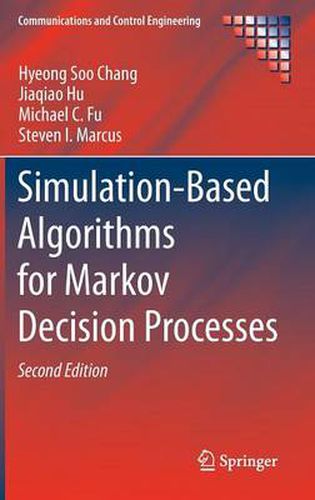Readings Newsletter
Become a Readings Member to make your shopping experience even easier.
Sign in or sign up for free!
You’re not far away from qualifying for FREE standard shipping within Australia
You’ve qualified for FREE standard shipping within Australia
The cart is loading…






This title is printed to order. This book may have been self-published. If so, we cannot guarantee the quality of the content. In the main most books will have gone through the editing process however some may not. We therefore suggest that you be aware of this before ordering this book. If in doubt check either the author or publisher’s details as we are unable to accept any returns unless they are faulty. Please contact us if you have any questions.
Markov decision process (MDP) models are widely used for modeling sequential decision-making problems that arise in engineering, economics, computer science, and the social sciences. Many real-world problems modeled by MDPs have huge state and/or action spaces, giving an opening to the curse of dimensionality and so making practical solution of the resulting models intractable. In other cases, the system of interest is too complex to allow explicit specification of some of the MDP model parameters, but simulation samples are readily available (e.g., for random transitions and costs). For these settings, various sampling and population-based algorithms have been developed to overcome the difficulties of computing an optimal solution in terms of a policy and/or value function. Specific approaches include adaptive sampling, evolutionary policy iteration, evolutionary random policy search, and model reference adaptive search.
This substantially enlarged new edition reflects the latest developments in novel algorithms and their underpinning theories, and presents an updated account of the topics that have emerged since the publication of the first edition. Includes:
innovative material on MDPs, both in constrained settings and with uncertain transition properties;
game-theoretic method for solving MDPs;
theories for developing roll-out based algorithms; and
details of approximation stochastic annealing, a population-based on-line simulation-based algorithm.
The self-contained approach of this book will appeal not only to researchers in MDPs, stochastic modeling, and control, and simulation but will be a valuable source of tuition and reference for students of control and operations research.
$9.00 standard shipping within Australia
FREE standard shipping within Australia for orders over $100.00
Express & International shipping calculated at checkout
This title is printed to order. This book may have been self-published. If so, we cannot guarantee the quality of the content. In the main most books will have gone through the editing process however some may not. We therefore suggest that you be aware of this before ordering this book. If in doubt check either the author or publisher’s details as we are unable to accept any returns unless they are faulty. Please contact us if you have any questions.
Markov decision process (MDP) models are widely used for modeling sequential decision-making problems that arise in engineering, economics, computer science, and the social sciences. Many real-world problems modeled by MDPs have huge state and/or action spaces, giving an opening to the curse of dimensionality and so making practical solution of the resulting models intractable. In other cases, the system of interest is too complex to allow explicit specification of some of the MDP model parameters, but simulation samples are readily available (e.g., for random transitions and costs). For these settings, various sampling and population-based algorithms have been developed to overcome the difficulties of computing an optimal solution in terms of a policy and/or value function. Specific approaches include adaptive sampling, evolutionary policy iteration, evolutionary random policy search, and model reference adaptive search.
This substantially enlarged new edition reflects the latest developments in novel algorithms and their underpinning theories, and presents an updated account of the topics that have emerged since the publication of the first edition. Includes:
innovative material on MDPs, both in constrained settings and with uncertain transition properties;
game-theoretic method for solving MDPs;
theories for developing roll-out based algorithms; and
details of approximation stochastic annealing, a population-based on-line simulation-based algorithm.
The self-contained approach of this book will appeal not only to researchers in MDPs, stochastic modeling, and control, and simulation but will be a valuable source of tuition and reference for students of control and operations research.